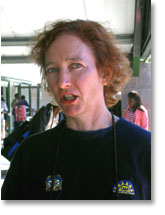
Libet Maloney came to Africa as a Peace Corps volunteer eight years ago and has lived and worked in the Caprivi Region of Namibia as a social worker for the last five years
In Their Own Words: Libet Maloney
In Their Own Words: Libet Maloney
Libet Maloney says there’s a fire burning in the Caprivi Region, a fire that needs to be fought… and quickly. She should know — because she has seen it spread. Libet came to Africa as a Peace Corps volunteer eight years ago and has lived and worked in the Caprivi Region of Namibia as a social worker for the last five years. In Caprivi, the HIV prevalence rate is 43%.
"The region has suffered a lot," she says. "Among other problems, the HIV epidemic has been stealing the region’s brightest stars. The young people are dying, and the number of orphans is growing. It’s a fire; a burning fire.
"When I first moved here, the dying was not the same," Libet says. "If you could go to the cemetery here now, especially on weekends, you would see that people have to make arrangements between families. They say, ‘I’ll have our burial in the morning, then you have yours in the mid-afternoon, and someone else says we’ll have ours in the late afternoon.’ It used to be there would be one funeral a month just like any other place. Now the funerals are every day. In the last two years, there can be weeks when I get calls every day saying so and so has passed away. These are young people; they’re not 70 and 80-year-olds. They are people who are teachers… mothers and fathers. And they are dying daily."
Libet thinks that the dying has led to something worse — an overwhelming hopelessness. "The pain that people feel, knowing people who are dying all around you, also creates fear that breeds helplessness. Once helplessness invades a community, then we’re in big trouble. And I think we are there now; we are in trouble. And that’s why I feel the work SECURE THE FUTURE is doing is so important, because I see it as a hand reaching into the fire and saying, let’s go — we can get out."
Recent efforts to mobilize the community and support a new treatment center in the Caprivi Region, Libet says, may lead to a new sense of empowerment — and hope. "To have a group of people focus on this region, focus money, but also focus their belief and their desire to help, makes people feel special. And I believe it might also make people say we’re not alone in this fight. I believe that will encourage people to say… Let’s start to take some actions and change our behaviors and also to try and learn about the ARVs (anti-retroviral therapies), PMTCT (HIV-positive mother-to-child transmission), voluntary testing and counseling, and the options that are available if they’re HIV-positive or even if they’re HIV-negative.
I know the SECURE THE FUTURE treatment site is a hand reached out to people that they will eventually take so they won’t die and families will continue to be able to operate as families. I think it will also offer the kind of hope that will encourage behavior change. Mostly, in ten years, I just hope that the daily dying has stopped."
Article Date: 07/08/2004
